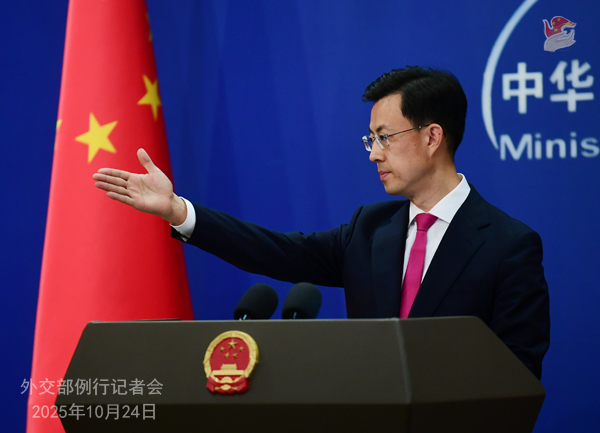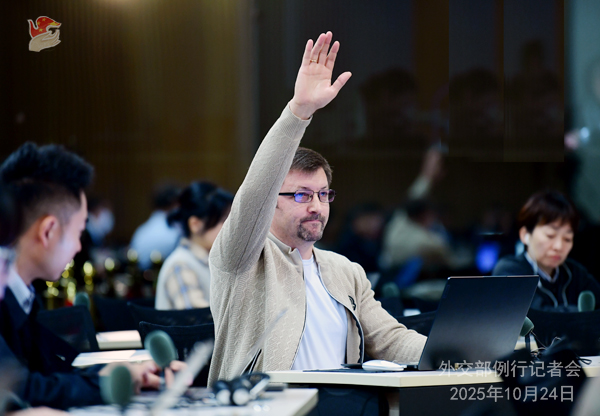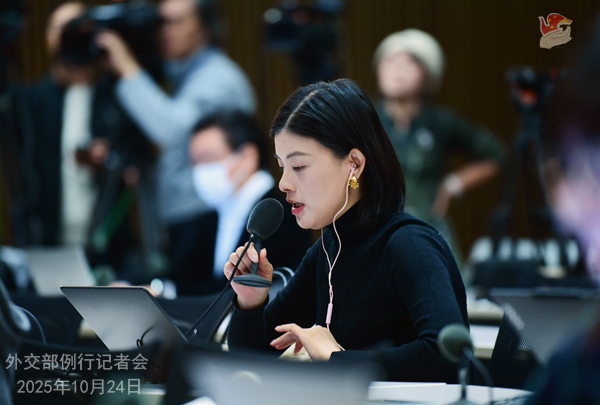
People’s Republic of China


At the invitation of Prime Minister Lawrence Wong of the Republic of Singapore, Premier Li Qiang of the State Council will pay an official visit to Singapore on October 25 and 26.
At the invitation of Prime Minister YAB Dato’ Seri Anwar bin Ibrahim of Malaysia, ASEAN’s rotating chair, Premier Li Qiang of the State Council will attend the 28th China-ASEAN Summit, the 28th ASEAN Plus Three Summit, the 20th East Asia Summit and the fifth Regional Comprehensive Economic Partnership Leaders’ Meeting in Kuala Lumpur on October 27 and 28.
On October 27, the Lanting Forum on Improving Global Governance to Build a Community with a Shared Future for Humanity will be held in the Ministry of Foreign Affairs. Member of the Political Bureau of the CPC Central Committee and Minister of Foreign Affairs Wang Yi will attend and address the opening ceremony.
At the forum, high-level representatives and renowned experts and scholars from China and abroad, and members of the diplomatic corps and representatives of international organizations in China will have an in-depth exchange of views on the various dimensions of the Global Governance Initiative and practical pathways toward it.
Xinhua News Agency: China announced that President Xi Jinping will attend the 32nd APEC Economic Leaders’ Meeting. Could you share with us the arrangement? What does China expect to achieve?
Guo Jiakun: APEC is the most important economic cooperation mechanism in the Asia-Pacific. President Xi Jinping attending the 32nd APEC Economic Leaders’ Meeting demonstrates the great importance that China attaches to economic cooperation in the Asia-Pacific. President Xi Jinping will deliver an important speech at the meeting and have bilateral meetings with leaders from relevant countries. China stands ready to work with all parties to contribute to cooperation and economic growth in the Asia-Pacific and jointly build an Asia-Pacific community with a shared future.
CCTV: President Xi Jinping is to pay a state visit to the ROK. Could you share with us China’s expectation of its relations with the ROK?
Guo Jiakun: China and the ROK are each other’s close neighbors and cooperation partners. China attaches great importance to its relations with the ROK and our policy on the ROK maintains consistency and continuity. This will be President Xi Jinping’s second state visit to the ROK in 11 years. This will also be the first meeting between leaders of the two countries after President Lee Jae-myung took office. China stands ready to work with the ROK to cherish the commitment made when establishing diplomatic ties, uphold good neighborliness and the friendly ties, work for mutual benefit, and move forward the strategic cooperative partnership.
CCTV: To follow up on Premier Li Qiang’s official visit to Singapore, what’s China’s comment on its relations with Singapore and what’s China’s expectation for the visit?
Guo Jiakun: China and Singapore are friendly neighbors and important cooperation partners. The two countries established the all-round high-quality future-oriented partnership in 2023. This year marks the 35th anniversary of China-Singapore diplomatic ties. The bilateral relations have continued to grow steadily with the concerted efforts of both sides. In June this year, President Xi Jinping met with visiting Prime Minister of Singapore Lawrence Wong, providing strategic guidance for the development of the bilateral relations in the next stage.
China hopes to work with Singapore through this visit to further synergize development strategies, deepen cooperation in various fields, have close communication and coordination on international and regional affairs, and jointly uphold multilateralism and free trade, so as to achieve new development of the bilateral relations and make greater contribution to regional and global peace and prosperity.
China News Service: You just announced that Premier Li Qiang will attend the leaders’ meetings on East Asian cooperation. How does China view the current East Asian cooperation and what is China’s expectation for the meetings?
Guo Jiakun: East Asia is one of the regions with the greatest dynamism and potential in the world. The ASEAN-led East Asian cooperation plays an important role for promoting dialogue and cooperation among participating parties and safeguarding regional stability. Amid the complex transformation of international and regional situation, sluggish global economic growth and rising unilateralism and protectionism, East Asian cooperation faces some complex factors. In this context, regional countries aspire more for stability, cooperation and development, and East Asian cooperation is all the more relevant today.
China always regards ASEAN as a priority in its neighborhood diplomacy. China supports the theme of “Inclusivity and Sustainability” set by ASEAN’s rotating chair Malaysia. China looks to working with ASEAN and regional countries to discuss plans for cooperation and development, honor our original commitments, build up consensus, enhance mutual trust, uphold true multilateralism and safeguard free trade and the multilateral trading system. We will work to build the China-ASEAN Free Trade Area 3.0 and ensure the high-quality implementation of the Regional Comprehensive Economic Partnership. We will also carry forward the Asian values of peace, cooperation, openness and inclusiveness, build a peaceful, safe and secure, prosperous, beautiful and amicable home, and provide more stability and certainty to the region and beyond.
China Daily: The fourth plenary session of the 20th Central Committee of the Communist Party of China (CPC) was closed yesterday and adopted a communiqué. The session received extensive attention worldwide. Foreign media commented that during the 14th Five-Year Plan period, overcoming various risks and challenges China has achieved remarkable socioeconomic development. The communiqué follows the direction of China’s policy. Despite the turmoil in multiple places in the world, China is committed to building a great modern socialist country. Can I have your comment on that?
Guo Jiakun: China is committed to advancing high-quality development and fostering new quality productive forces. Remarkable achievements have been scored. During the 14th Five-Year Plan period, China has seen its GDP surpassing RMB 130 trillion and breakthroughs in such emerging industries as artificial intelligence and new energy. The “world’s factory” has become the global innovation powerhouse. China is committed to high-standard opening up. China further shortened the negative list for foreign investment and its overall tariff level has been cut to 7.3 percent. We forged high-quality Belt and Road cooperation ties with more than 150 countries and over 30 international organizations. China’s contribution to global economic growth has stood at around 30 percent, making it a key driver and source of growth for global development.
The fourth plenary session of the 20th CPC Central Committee successfully concluded yesterday. One of the important outcomes is that the session deliberated over and adopted the recommendations for formulating the 15th Five-Year Plan, sending out the message that the consistency of China’s policy and its steady economic growth and development prospect provide valuable certainty to this volatile world. From the 14th Five-Year Plan to the 15th Five-Year Plan, China has shown its firm resolve and perseverance and spelled out the key to China’s good governance. Looking forward, China, a confident and open country, will share opportunities and pursue common development with countries around the world, advocate an equal and orderly multipolar world and a universally beneficial and inclusive economic globalization, and promote the building of a community with a shared future for humanity.
Shenzhen TV: German Foreign Minister Johann Wadephul told Reuters in an interview that his upcoming trip to China starting from October 26 marks his first visit to China as foreign minister. Wadephul emphasized that the federal government is interested in close economic and trade relations and good bilateral cooperation with China, and that decoupling would not be the right strategy. What’s China’s comment?
Guo Jiakun: China noted Foreign Minister Wadephul’s remarks. China and Germany are comprehensive strategic partners. Over the past 53 years of diplomatic ties, the two countries have achieved robust development in the bilateral relationship and deeply integrated industrial development, giving a strong boost to the two countries’ respective development. In a volatile and turbulent world, China and Germany, as two major countries and economies in the world, need to set examples in forging a new type of major-country relations, uphold mutual respect, equality and win-win cooperation, and make greater contribution to world peace and development through the stability of China-Germany ties. It is also what the two peoples, including those from the business community in Germany, expect from us.
Due to differences in history, culture, social system and development stage, it is natural for China and Germany to differ in their opinions on certain issues. The two sides can enhance understanding and mutual trust through candid communication. We hope that Germany will uphold an objective and just attitude, foster a positive and rational perception on China, and work with China to promote and keep the bilateral relationship on the right track.

AFP: Japan’s new Prime Minister Sanae Takaichi said today that she would try to achieve the country’s target of spending 2 percent of GDP on defense two years early. She also warned that the military activities of neighboring countries, China, North Korea and Russia, have become a grave concern. What is China’s response to her comments?
Guo Jiakun: I answered a relevant question yesterday. Let us stress once again that with respect to peace and security, China has the best track record. In recent years, however, Japan has been drastically readjusting its security policy, increasing defense spending year after year, relaxing restrictions on arms export and seeking military breakthroughs. Japan’s neighboring countries in Asia and beyond have to strongly call into question its commitment to the exclusively defense-oriented policy and the path to peaceful development. This year marks the 80th anniversary of the victory of the Chinese People’s War of Resistance Against Japanese Aggression and the World Anti-Fascist War. We urge Japan to deeply reflect on its history of aggression, commit itself to the path of peaceful development, act prudently in military and security areas, and avoid further losing the trust of its Asian neighbors and beyond.
Bloomberg: The Foreign Ministry just announced that from October 30 to November 1, President Xi Jinping will travel to the ROK to attend the 32nd APEC Economic Leaders’ Meeting. Will he meet with U.S. President Donald Trump on the sidelines of the meeting?
Guo Jiakun: China and the U.S. are in close communication on a meeting between the two presidents. We will keep you updated on that.
Hubei Media Group: A delegation of the Organization of Islamic Cooperation has visited Xinjiang. Could you share more details with us?
Guo Jiakun: This year marks the 70th anniversary of the founding of the Xinjiang Uygur Autonomous Region. Invited by the Ministry of Foreign Affairs, a delegation of the Organization of Islamic Cooperation (OIC) visited Xinjiang from October 19 to 21. They visited an achievement exhibition in commemoration of the anniversary, Xinjiang University, the Xinjiang Islamic Institute, the Xinjiang Museum, and the Xinjiang Software Park. They also engaged with a local community and had an in-depth exchange of views with people of different ethnic groups there. The Head of the autonomous region met with the delegation.
The delegation said that Xinjiang has taken on a fresh look and scored remarkable achievements over the past 70 years, and people of different ethnic groups live a life of happiness and prosperity. These are successful stories of Chinese modernization, which demonstrate the Chinese government’s people-centered vision of development. Members of the delegation noted that cooperation and mutual trust is the defining feature of the relations between China and Islamic states. They looked forward to greater cooperation in trade and technology and people-to-people and cultural exchanges.
China will continue to actively move forward its friendly ties with Islamic states and the OIC for more achievements in cooperation. We also sincerely welcome more friends to visit Xinjiang.
Global Times: We noted that China exposed a case about the U.S. National Security Agency carrying out cyberattacks and infiltration against China’s National Time Service Center. The National Computer Network Emergency Response Technical Team/Coordination Center of China released a technical analysis report about the case, which lays out facts and iron-clad evidence about the U.S.’s cyberattacks and infiltration against China’s key communication infrastructure. What is the Foreign Ministry’s comment?
Guo Jiakun: China strongly condemns the U.S. government carrying out cyberattacks and infiltration against China’s key infrastructure and presetting vulnerabilities for future large-scale sabotage activities.
According to reports of a Chinese cybersecurity institution, the so-called “Volt Typhoon” that the U.S. once blamed on China is actually a transnational ransomware group. The NSA case is self-evident that what a real “Volt Typhoon” operation looks like and the U.S. is the world’s No.1 hacking state. These moves of the U.S. government risk misunderstanding and miscalculation. Such behavior is extremely irresponsible.
China urges the U.S. to stop cyberattacks on China’s key infrastructure at once. We will take all measures necessary to defend its sovereignty and security in cyberspace.
NHK: When answering a question about the congratulatory message to Japanese Prime Minister Sanae Takaichi at yesterday’s press conference, the Chinese side responded that China made proper arrangements according to diplomatic practices. Can you confirm it?
Guo Jiakun: As you just said, I answered a relevant question yesterday. Let me stress once again that China made proper arrangements according to diplomatic practices. China and Japan are each other’s close neighbors. China’s fundamental position on its relations with Japan is consistent and clear. We hope that Japan will work with China, observe the principles laid down in the four political documents between the two countries, honor its political commitments on major issues concerning history and Taiwan, uphold the political foundation of the bilateral relationship, and fully advance the China-Japan strategic relationship of mutual benefit.
Ukrinform News Agency: Ukrainian President Volodymyr Zelenskyy yesterday at a press conference in Brussels stated that there is no permanent dialogue between the leadership of Ukraine and China and that China provides Russia with assistance, thanks to which Russia has an ability to continue its aggressive war against Ukraine. How does the Foreign Ministry respond to that?
Guo Jiakun: China’s position on the Ukraine crisis is always based on the true merits of the issue. We’ve been working relentlessly to promote a ceasefire and talks for peace and our effort speaks for itself. China will continue calling for peace and dialogue and playing a constructive role for deescalation and a political settlement of the Ukraine crisis.
AFP: Mainland China and India will resume direct flights starting this coming Sunday and Monday. Does the Foreign Ministry have a comment on this and its significance to China-India relations?
Guo Jiakun: The resumption of direct flights between China and India is the latest move that demonstrates how the two sides faithfully act on the important common understandings reached between the leaders of the two countries in Tianjin. It’s also an active move that facilitates the friendly exchanges of over 2.8 billion Chinese and Indian people. China stands ready to work with India to view and handle bilateral relations from a strategic and long-term perspective, and move forward relations on a sound and steady track so as to deliver more tangibly for the two countries and peoples and make due contributions to upholding peace and prosperity in Asia and beyond.
Beijing Youth Daily: According to Reuters, German Foreign Minister Johann Wadephul also said in the interview, “Our one-China policy continues unchanged and we decide on its design. This also includes that there must be no violent change of the status quo.” Can I have your comment on that?
Guo Jiakun: There’s but one China in the world and Taiwan is part of China. The government of the People’s Republic of China is the sole legal government representing the whole of China. This is the most complete and accurate and only definition of the one-China principle. There is no justification or room for individual definition.
The greatest threat to peace and stability across the Taiwan Strait comes from the separatist activities of “Taiwan independence” forces and the external connivance and support they receive. To maintain cross-Strait peace and stability, one must uphold the one-China principle and unequivocally oppose “Taiwan independence.” Those who only call for no change of the status quo across the Taiwan Strait and do not oppose “Taiwan independence” are actually aiding and abetting “Taiwan independence” separatist activities, which will disrupt peace and stability across the Taiwan Strait.
We hope Germany will strictly abide by the one-China principle and unequivocally oppose “Taiwan independence” separatist activities.
NHK: While in the ROK, will President Xi Jinping meet with Japanese Prime Minister Sanae Takaichi?
Guo Jiakun: China announced that President Xi Jinping will attend the 32nd APEC Economic Leaders’ Meeting and pay a state visit to the ROK. Information on relevant events will be released when available.




